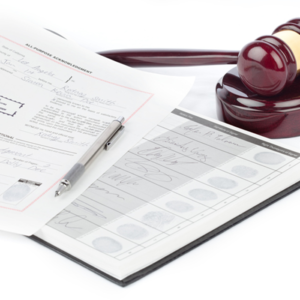IS STENOGRAPHY THE RIGHT CAREER FOR YOU?
Take the Quiz to Find Out!

A court reporter, also known as a “stenographer,” is a highly trained professional who provides an integral and necessary service to our legal system. As dedicated custodians of the record, court reporters rely on a highly refined set of skills to accomplish the task of capturing the spoken word in realtime with the use of a Stenotype machine, a special shorthand keyboard.
Most qualified stenographic reporters work as an independent contractor, making a great living as a freelancer paid on reporting assignments convenient to their schedule. An independent contractor is a self-employed businessperson. This means you are responsible for items like your own benefits, office space, equipment, and work schedule. Some work as official reporters in a courthouse, provide closed captioning from home, in classrooms or large venues, work in government settings, and even Capitol Hill.


Stenographers are in high demand and should commit to working a minimum of 16-20 hours each week. Of course, you also have the opportunity to work more and make more money.


Unforeseen events can sometimes happen while on a job requiring stenographic reporters to make changes to their plans due to an assignment going longer than anticipated, sometimes into the night, requiring quick turnaround of transcripts, while remaining calm and professional the whole time. These unforeseen events do provide for a significant increase in earnings.


While a stenographer is not a lawyer, you will be involved in legal proceedings. You will see justice unfold right in front of you and hear many different case details.




A stenographic reporter brings to every assignment equipment minimally consisting of their stenotype machine with a stand, at least one laptop, and the necessary cables and power cords to each assignment.


Completion of the entire program takes two to three+ years with two being the goal. Students who finish in two years or less are those who practice several hours per day or sign up for My Realtime Coach. Upon successful completion of the program, a qualified stenographer will have the opportunity to work as an independent contract freelance reporter, an official reporter in a courthouse, provide closed captioning, work in government settings and even Capitol Hill.




Stenographers must be a Notary Public. A Notary Public is an official of integrity appointed by state government to serve the public as an impartial witness in performing a variety of acts related to the signing of important documents, attesting to a person's identity, and administering the oath to individuals before they testify in depositions, hearings and examinations under oath. Most state Notary Public licenses require you to pass a notary examination, complete a background check, and have US residency/US citizenship.


As a stenographic reporter, you could be assigned to a different legal proceeding each day requiring you to travel from location to location, law office to law office. One day it could be a local cruise ship, the next day a law firm. Every day is different, including the hours.


One of the core pieces of equipment for a stenographer is a laptop. This runs the necessary software to translate your stenotype notes into English, edit your transcripts, as well as process audio recordings.


Stenographic reporters require specific equipment to capture and create the verbatim transcript. Besides a stenotype machine that students must have to begin the program, with manufacturers offering numerous options to rent, purchase or lease-to-own, stenographers will eventually need to purchase software used for translation and editing, your own laptop, necessary cables, cords and a remote microphone.


As we all know, technology can be finicky, so stenographic reporters must be proficient with technology (or at least be willing to troubleshoot tech issues with some remote guidance) to ensure everything runs smoothly.



A strong stenographer will be a stickler for details and enjoy following specific instructions and procedures.


Stenographic reporters also spend a lot of time on computer keyboards editing transcripts.



Stenographic reporters are constantly exposed to new and different topics, many of which they have no prior knowledge of, if they even knew they existed. Prior to the internet they had to have at their fingertips medical, legal and English dictionaries, references books, thesauruses, local, state and world atlases and more in order to produce an accurate transcript. The internet has cleared off those tables and now put all the information at your fingertips on the laptop you edit transcripts with.


As part of a legal proceeding, a stenographer must act professionally. This includes wearing professional attire, being 100% prepared, setting up on time and exuding a peaceful, welcoming and pleasant demeanor.


As an officiant, there are times a stenographic reporter must command the room and ensure the legal proceeding stays on track, while there are other times the reporter must be a silent partner capturing the record.



As part of the justice system, all court reporters are officers of the court and, as such, must have a high value of ethics, including but not limited to, maintaining impartiality and neutrality, safeguarding the record and respecting off-the-record statements.


Much like courtroom scenes on TV, legal proceedings can be tense, high-pressure situations and a stenographic reporter must remain a neutral, composed party throughout.


Many legal cases contain confidential information. It is imperative that a stenographer maintains the highest level of prudence, discretion and objectivity when dealing with that information.


Stenographic reporters are usually assigned to their proceedings the day prior, so you may not know your schedule for the next day until the afternoon before. You will have the flexibility to accept assignments that work with your schedule.


Most legal proceedings are held in law firms, and those locations can vary by case. As a stenographer, you may find yourself going someplace different every day.


Legal Proceedings obviously involve lawyers. As a participant in the legal process, a stenographic reporter must be comfortable interacting with attorneys and legal professionals of all types.



Loading...